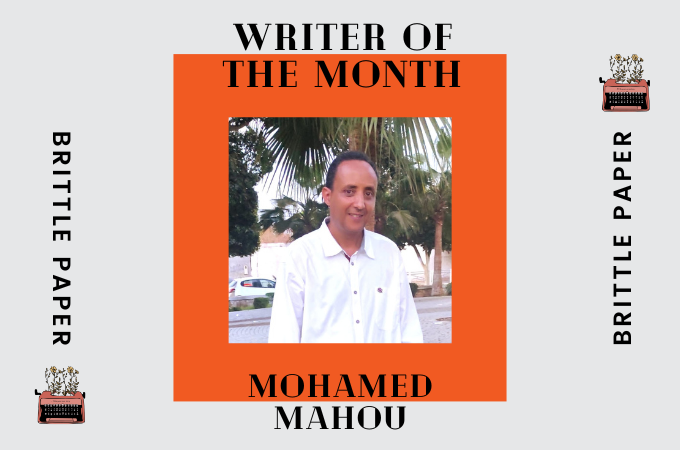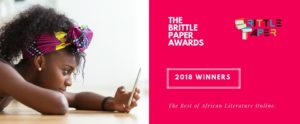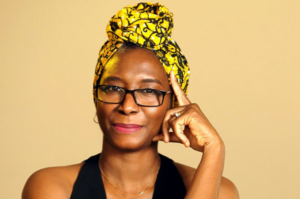
Brittle Paper’s Writer of the Month for October is Mohamed Mahou!
Mohamed Mahou grew up in the Souss Region of Morocco. He went to Ibn Zohr University in Agadir, Morocco, where he received his Bachelor’s degree in English Studies, and where he later earned his Master’s degree in Comparative Studies. For over twenty years, he has been a high school English teacher.
Mahou writes poems in Tamazight and English and has taken part in different national and local poetry events. As he continues his literary journey, Mohamed remains committed to bridging cultural divides through the power of words. His poems, plays, and stories are not only a celebration of Amazigh culture, but also a reminder of the universal language that binds us all – the language of storytelling and the shared human experience. He hopes to publish his first novel one day which we are hoping for as well!
With introductions taken care of, let’s sit down with Mohamed Mahou!
Brittle Paper
Mohamed, congratulations on being our October Writer of the Month! Your piece “Break a Leg” is such a wonderful bag of mixed emotions presented in a beautiful way. When I think about your story, or read through some of your other published works, I so strongly wish you had a collection of short stories I could carry around with me. But before we jump into your stories, let’s first properly introduce our readers to Mohamed Mahou and how you started your journey as a writer.
Mohamed Mahou
Let me first express my heartfelt gratitude to Brittle Paper for this unexpected nomination and the opportunity to be featured in your online magazine.
My passion for writing dates back to my high school days at Adellah Ben Yassine in Inezgane in the1990s. It was there that I first dipped my toes into the world of words. Later, at Ibn Zohr University, I became involved in the university’s poetry club, which was led by Professor Driss Bakka. Members of the club met each week to discuss the art of crafting poems and we exchanged views about our creative works. During this time, I even had a few of my poems published in a Moroccan newspaper called the Messenger of Morocco.
My literary journey took a significant turn after graduation when I connected with members of the Alliance of Writers in Amazigh (Tirra). I was introduced to the world of Amazigh literature through their guidance, and my first collection of poems, titled “Oceans of the Heart,” was published with their help. Since then, I’ve found immense joy in writing, transforming it from a passing fancy into a treasured hobby that continues to inspire and motivate me.
Brittle Paper
There are some questions I ask every WotM because I think it helps to get to know them, but also just because I am quite interested in the answers.
Let’s start with, do you have an all-time favourite book and why? I will graciously let you do a top 3 if you cannot pick just one.
Mohamed Mahou
Actually, there are a lot of books that I enjoy reading, but I will mention three here:
Ralph Ellison’s Invisible Man because it’s a book I have worked on for my master’s thesis. I believe it’s a literary masterpiece that explores the concept of invisibility in today’s world. It exposes the complexities of racism and marginalization.
Chinua Achebe’s Things Fall Apart is a seminal work that introduced me to the beautiful world of African literature. Achebe’s way of storytelling challenges stereotypes and colonial narratives, providing a powerful voice to African perspectives and traditions.
Mohamed Choukri’s For Bread Alone. I have read it many times. Choukri paints a vivid picture of the tough life in Morocco during colonization, with poverty, addiction, and the struggle to survive. It’s a truly powerful book.
Brittle Paper
Those are three amazing choices! I studied Invisible Man at university, and I think it is one of those books everyone will enjoy, be it to be inspired or to feel angry or just for good literature. Things Fall Apart is the book everyone needs to read at least once in their lifetime. As for For Bread Alone, I haven’t read it but it is officially on my list.
Which writer do you adore but think that they have not received their fair share of flowers?
Mohamed Mahou
I adore Haruki Murakami as a novelist, and it’s surprising that he hasn’t received the Nobel Prize in Literature. His storytelling is unique and captivating, and his writing style has captured the hearts and minds of readers all over the world.
Brittle Paper
Last question, if you could have a dinner party with your favourite artists, who would they be?
Mohamed Mahou
Choosing just a few artists is tough because I adore them all! But if I had to pick, here’s my dinner party guest list:
For literature, I’d love to invite Toni Morrison and Ralph Ellison. Their books have been my companions during my university days, and I have enjoyed their writing styles and their ways of diving deep into African American culture. Chatting with them about their writing processes and the themes they’ve explored would be a dream come true.
A dinner party without music is like a cake without icing. That’s why, Bob Marley and Ammouri Mbarek would definitely get an invite. I admire how they tackle important issues and engage their audiences. It would be incredible to pick their brains.
Finally, Charlie Chaplin would undoubtedly be on my list. I’m desperate to learn the secrets behind his silent comedy’s success. He has the ability to capture the hearts of people all over the world.
Brittle Paper
I have been asking the dinner party question for the past couple months and each time the answers get more and more interesting!
Now, I am really excited to finally start talking about your work and as I mentioned above, your writing makes me wish I could carry around a collection of your short stories. I want to be perfectly clear that I am not just saying this to emphasise how much I like your writing but rather it is based on my recent travels. While away, I was working on your piece and the warmth, complexity, entertainment, and just brilliant storytelling made me so badly want to be able to sit anywhere in the world and be able to pull out the collection and lose myself in your stories. My first question is very much fuelled by selfish reasons, but will we ever get the privilege of one day owning a collection of Mohamed Mahou’s short stories?
Mohamed Mahou
I appreciate your kind words, and your interest means a lot to me. Like any writer, I dream of seeing my stories in a book someday. As you know, publishing and marketing a book is very demanding. It’s really difficult for new writers to find an editor and agent to make that dream come true. I believe it would be my greatest achievement to hold a collection of my stories in my hands one day.
Brittle Paper
Fingers crossed that soon you find someone worthy of publishing a collection of your stories and that I can be the first to buy it.
Now, your May piece, “Break a Leg,” is a gorgeously told story. We have a man who is struggling to find his place in a society he acknowledges only has limited groups to venture into. What I love the most is that the story does not romanticise life, cultural expectations or dreams and instead places it within a very real world and shows the complex dynamics that exist in this situation.
This may be a difficult question to sum up in your answer but can you take us through the inspiration and motivation behind writing this story?
Mohamed Mahou
“Break a Leg” tells the story of a graduate who is struggling to fit in. He faces difficulties in his family and community. Writing poetry becomes his refuge, but life’s pressures force him to consider a life as a beggar, which is totally insane. What inspired me to write this story is a common problem I see in my country: many graduates are looking for work. Some aspire to be teachers, but the recently imposed age limit of 30 by the Moroccan ministry shatters their dreams. Other themes that readers will come up with include resilience, survival, and self-discovery. The story emphasizes people’s determination and resilience in the face of adversity. By the way, the name “Idder” in my native language, Tamazight, means “alive,” and so, despite all the challenges, the main character is very much representative of his name in that he perseveres and survives.
Brittle Paper
Sometimes my years in academia get the best of me and I read stories as a literary student still, by pulling out phrases or sections I think will be great to centre a whole discussion around and this story has so many of these great parts. One of my favourites is:
In the town of Tanalt, three types of individuals could be identified: salespeople, public servants and beggars. Idder was unable to identify the category to which he belonged. Nonetheless, he tried to convince himself that he belonged to a distinct group of people, one he dubbed “intellectuals.” It was a category that he had created for himself and of which he was the sole member.
This part is so telling of Idder’s character that borders between loving his people and also ego. But what I love most is that this section also relates to so many artistic individuals stuck in a society that has no real space for them to exist as is.
Mohamed Mahou
You’re absolutely right about this. I’m glad you enjoyed it. In fact, the story’s central character, Idder, lives in a small town with few opportunities for self-improvement. He faces numerous challenges after graduation. Due to his mother’s illness, he is unable to relocate to a nearby city, and he is unable to find work in Tanalt that matches his qualifications as an English major. Under the weight of these difficulties, and influenced by his mother’s wishes and Aami Ottman’s criticism, he considers becoming a beggar.
I intentionally left the story open-ended to allow readers to consider potential solutions to such dilemmas, which I believe are common worldwide. Idder does not feel at home in his hometown. He is an intellectual who, in the words of Homi Bhabha, lives in the “third space,” finding solace and joy in poetry. Nonetheless, he persists in his quest for self-discovery despite the daunting obstacles he faces.
Brittle Paper
The “third space” is a brilliant way to describe the position Idder finds himself in.
I read through some of your other published works and something I have noticed, which I hope you will correct me on if I am generalising your work here, is that you play around with form and always depict Moroccan representation in such diverse ways. In “Atlas Raging Gale,” you include poetry within the story as you do in “Break a Leg” which I love because a mixed form of storytelling, to me, is a beautifully curated mess to get lost in. And then in both the previously mentioned stories as well as in “A Yellow Vest’s Protest,” you present rich Moroccan settings to a wide array of characters that seem very representative of different types of people in Morocco but also of many different people across the continent and diaspora.
Am I completely off the mark or is my comment somewhat true [laughs]?
Mohamed Mahou
Absolutely, I enjoy blending genres in my writing whenever possible. This genre fusion allows me to incorporate various voices into a story, such as the narrator’s, the characters’, and that of a poet or another writer. This blending contributes to the reader getting a more vivid and engaging picture. I want to clarify one point. The poems featured in “Atlas Raging Gale” are not mine; they belong to Mririda n’Ait Attik and have been translated by Daniel Halpern and Paula Paley. My story is a modest attempt to bring these poems to life and shed light on the work of a female Moroccan poet who has been overlooked by many.
One important aspect of my stories that I emphasize is the marginalization that certain people in my society face. I want their stories to have a strong emotional impact on readers, and I also want to shed light on some aspects of Moroccan culture. My readings of African American writers such as Ralph Ellison, Toni Morrison, and Richard Wright have inspired this technique of writing. These authors, along with many others, have successfully highlighted and celebrated African heritage in their influential works, creating powerful narratives that bridge cultures and bring important social issues to the forefront of literature.
Brittle Paper
That’s a beautifully put answer and I am interested in reading more about Mririda n’Ait Attik and her work.
My favourite writers are those who can write about anything, be it light-hearted or heavy in content, but present it in such an easy, comforting, and gripping way and your writing is that in every way. I am very thankful I got to publish this piece and even more thankful I get to publish another on Monday! Without giving too much away, what can you tell our readers about Monday’s story?
Mohamed Mahou
Concerning Monday’s story, I want to reassure readers that it will follow the same style, focusing on a marginalized Moroccan individual. However, there is an exciting change in this story: I’m experimenting with a first-person narrative. I’m giving the main character a voice so that he can tell his own story. I hope Brittle Paper readers find my new experiment enjoyable and engaging.
Brittle Paper
I have no doubt that we will all find the story enjoyable!
Before we go, apart from your writing, Mohamed, what is one thing about yourself that you want to share with our readers?
Mohamed Mahou
Apart from writing, I find great fulfillment in teaching. I strongly believe that Morocco, like all African countries, can drive a positive and transformative change through a strong educational system. In my role as an educator, I am fully committed to playing my part in empowering young Moroccans by providing them with the knowledge and skills they need to achieve their dreams.
Finally, I want to say a big thank you to you for letting me share my work with Brittle Paper’s readers. Your kind words about my stories mean a lot. I really appreciate all your hard work in helping new African writers. Thank you for being such a wonderful support.
Brittle Paper
It is my absolute pleasure! There is nothing more fulfilling than getting to work with brilliant writers and being able to have a conversation with a writer I am excited to know more about is one of the best parts of my job, so thank you!
For more of Mohamed’s work, be sure to check back in on Monday, and for more interviews with our writers, check out our last month’s with Cynthia Ajuzie here.








Mohamed Mahou October 07, 2023 14:27
Thank you so much, Si Mohamed.